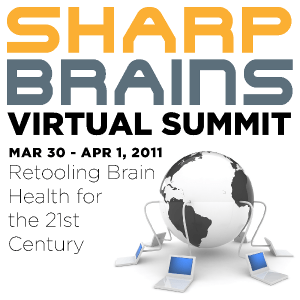2011 SharpBrains Summit Meeting Report: Retooling Brain Health for the 21st Century
 After months of hard work by six participants @ 2011 SharpBrains Summit, we are honored to publish this Meeting Report to help generate a broader conversation on what we believe is one of the main opportunities and challenges of our times: How to Retool Brain Health for the 21st Century. This Meeting Report has been prepared by: Alvaro Fernandez (SharpBrains), Luc P. Beaudoin (Simon Fraser University), Muki Hansteen-Izora (Intel Corporation), Margaret E. Morris (Intel Corporation), Joshua R. Steinerman (ProGevity Neuroscience), Peter J. Whitehouse (Case Western Reserve University), and is fully accessible Here.
After months of hard work by six participants @ 2011 SharpBrains Summit, we are honored to publish this Meeting Report to help generate a broader conversation on what we believe is one of the main opportunities and challenges of our times: How to Retool Brain Health for the 21st Century. This Meeting Report has been prepared by: Alvaro Fernandez (SharpBrains), Luc P. Beaudoin (Simon Fraser University), Muki Hansteen-Izora (Intel Corporation), Margaret E. Morris (Intel Corporation), Joshua R. Steinerman (ProGevity Neuroscience), Peter J. Whitehouse (Case Western Reserve University), and is fully accessible Here.
You will find many valuable recommendations, such as “repeated, frequent, assessment (of brain function) over time (i.e., monitoring) with the use of consumer-facing technologies is preferable to a single assessment”, and deep insights such as “But it was reported (that brain training can work) to be possible when basic “conditions for transfer” are met, such as proper identification of deficit in target population and sufficient training “dose” Several speakers confessed to be “shocked” by the strength of the negative claims made by the “BBC brain training” Nature paper in spite of the “homeopathic dosing” of the intervention.”
ABSTRACT
The 2011 SharpBrains Virtual Summit brought together more than 260 research, technology and industry innovators in 17 countries for 3 days to discuss the rapidly evolving developments in science, technology and policy relevant to brain health across the lifespan. A number of important themes emerged from the talks and discussions, including potential approaches to developing a rich digital toolkit to monitor and maintain cognitive and emotional health, the need for innovative cross-sector partnerships and the urgency of scaling up solution to address growing societal needs. Also discussed were required scientific frameworks, marketing standards, analysis of latent consumer demands, and methods to disseminate and discuss timely information and analysis – such as virtual conferences to bring together multiple stakeholders to enable cross-sector collaboration and foster innovation. Global priorities such as optimizing cognitive and emotional health across the lifespan provide a compelling reason to innovate about the process of innovation itself, pooling the efforts of hundreds of pioneers across the traditional silos of geography, sector and profession. Virtual conferences can enable successful distributed collaboration when they focus on appropriate use of the digital medium, deliver a clear value proposition to participants and prioritize ease of technical access.
The major message from the 2011 SharpBrains Summit was the need to devote sufficient attention and resources to preventive and capacity-building brain health strategies across the lifespan, and that a new generation of reliable and inexpensive assessment and monitoring strategies of cognitive and emotional health are essential and attainable components of such strategies. Education, health care, medical, insurance and neurotechnology models will need to adapt to better serve societal needs in this emerging scenario. There is a need to reduce the traditional dependence on invasive drugs and devices driven by disease-based models. Participants expressed optimism, with which we agree, about the potential of rigorous new research and innovation and a resulting marketplace founded on concepts of cognitive reserve and neuroplasticity.
To meet growing demands, the process of innovation process must be accelerated. Virtual international conferences greatly facilitate knowledge sharing and networking in a way that is responsive to tight travel budgets and the rapid advances in technology and science. Virtual events can help to critically evaluate emerging requirements, research and products. They can promote the development of inter-personal relationships that are important for applying and advancing knowledge and technologies beyond traditional silos. The success of these conferences is predicated on their organizers understanding the participants’ needs, especially that of technical simplicity.
–> To Read the Full Meeting Report, including Introduction, Summary of Main Take-Aways, Emerging Themes and Implications, and a Word about the Format, click HERE.



